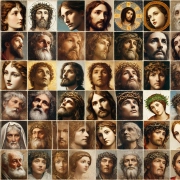By Francesco Schiano Lomoriello, GBU Staff in Naples.
The expression ‘search for the historical Jesus’ refers to the effort to reconstruct a portrait of Jesus of Nazareth that bypasses that offered by the gospels, in order to come as close as possible to the historical truth.
The starting assumption is that the authors of the Gospels were not motivated by a desire to report objective truth, but by theological and doctrinal intentions. Therefore, they are accused of having included in their accounts facts that did not really happen, or at least not in the manner described, in order to support the positions of the Christian communities of which they were an expression.
Three stages of research
Today, three phases of research can be recognised:
– The first developed between the 18th and the early part of the 20th century. Illuminist-derived Rationalism led scholars such as Hermann Reimarus to suggest the difference between the ‘Christ of Faith’ and the ‘Jesus of History’. Biographies of Jesus were written that were above all an attempt to rationalise and naturalise the gospels, purging them of all supernatural elements. Rudolf Bultmann was the last protagonist of this phase and the one who put an end to it. He suggested that the Jesus of History was inaccessible to research. This conclusion was motivated by the observation that every biography of Jesus published in the previous two centuries had offered a different portrait from the others, fuelled not so much by the desired criteria of objectivity, but by the orientation and prejudices of those who had proposed it.
– It was in fact a disciple of Bultmann, Ernst Kasemann, who was the initiator of the second wave of studies on the historical Jesus. Convinced, unlike his master, of the possibility of bridging the gap between the Christ of Faith and the Jesus of History through the critical study of New Testament texts. It was the middle of the 20th century and this season was short-lived because important archaeological discoveries imposed a new approach to research.
– Studies based on discoveries such as the Nag Hammadi Library and the Qumran Scrolls allowed historians to gain a deeper understanding of the society and culture of the ancient Middle East. This knowledge is the foundation of the third phase approach of research on the historical Jesus. Since the 1960s, more and more scholars have become interested in the possibility of distilling historical truth from the New Testament texts. This is done not only through philological and literary work, but by analysing the biblical accounts in the light of the knowledge gained about the society in which Jesus lived and the gospels were written. An important feature of this third phase is the presence among its initiators of atheist and agnostic scholars, who in some cases are deconverted Christians.
How to address the issue
Confronting the works of scholars, past and present, who strongly question the reliability of the Gospel accounts can be no small challenge for believers. However, we have the tools to meet that challenge and turn it into an evangelistic opportunity.
1. Eyewitnesses and the real Jesus
The starting assumption we have referred to, namely the belief that the canonical Gospels do not represent historical accounts but theological reconstructions of the figure of Jesus, is by no means proven. The internal evidence seems to suggest quite the opposite. If one considers the presence of so many details that are not necessary to the narrative (the number of fish caught at the second miraculous catch, the young man covered by a sheet present at Jesus’ arrest, the fact that John arrived at the tomb before Peter, etc.), the stories that make the Gospels look bad, the stories that make the Gospels look bad, etc., the stories that make the Gospels look bad. ), to the stories that cast the disciples in a bad light, or to the declaration of intent that Luke offers at the beginning of his Gospel (…it seemed good to me too, after having thoroughly informed myself of everything from the beginning, to write about it in order…), it can be reasonably argued that the evangelists reported eyewitness accounts with the aim of presenting us with the real Jesus.
It is precisely the category of testimony that scholar Richard Bauckham suggests in his Jesus and the Eyewitnesses in order to properly understand the literary genre Gospels. Extremely subjective, but not unreliable.
On the other hand, the date of publication of the New Testament writings, which can be placed at the latest between 60 and 95 A.D., makes it rather difficult to argue that they contain myths and legends, since eyewitnesses of the narrated facts were still in circulation at that time.
2. Meet the Christ by researching the historical Jesus
Today, most students are convinced that the Bible is not a reliable text; to speak about Jesus from what the Gospels say often means clashing with this prejudice. In such a context, the search for the historical Jesus represents a meeting point between the believer and the sceptic. In other words, one can approach the New Testament texts as a sceptic and analyse them with the tools of modern historiography. One can try to understand who Jesus of Nazareth was, without first accepting the doctrine of the inspiration of the Bible, and meet the Christ.
There is no shortage of testimonies from ordinary people and scholars who, analysing the Gospels as non-believers, ended up recognising Jesus as their God and Lord, just as happened to the first sceptic, the disciple Thomas.






